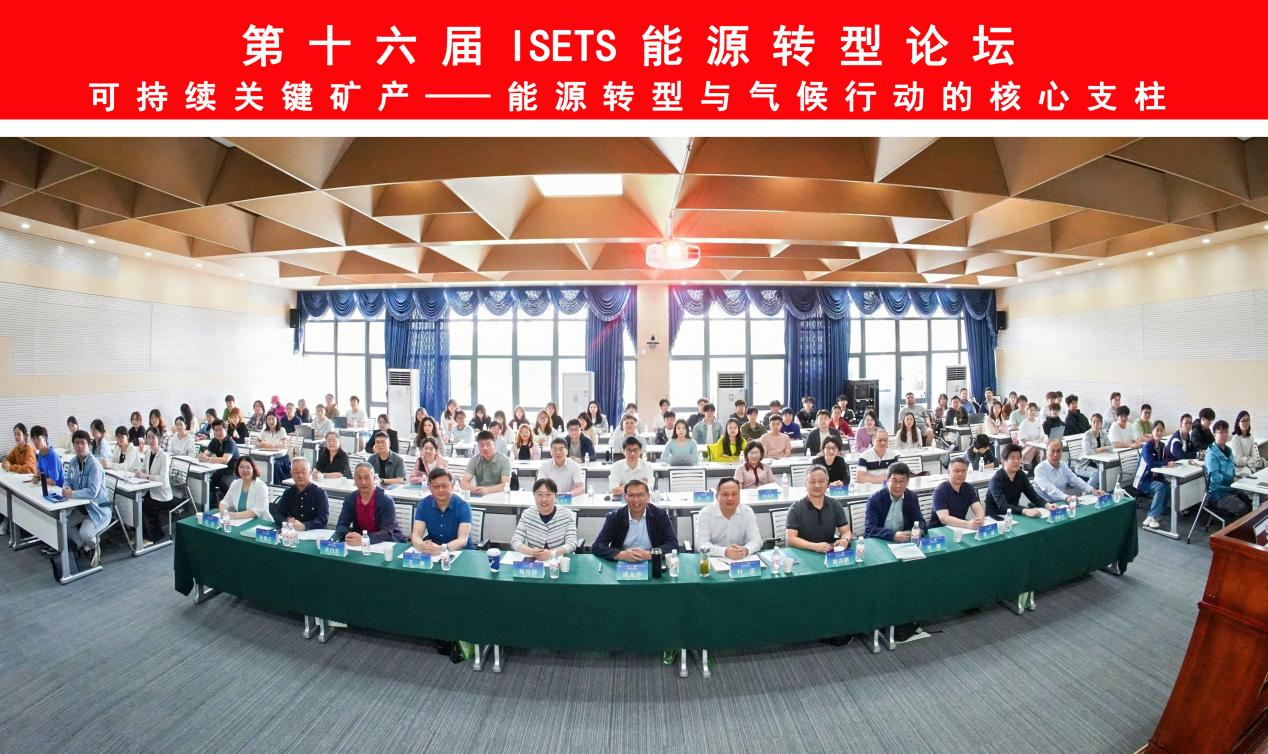The 16th ISETS Energy Transition Forum was successfully held at Hubei University of Economics
News Release:
On May 23, the 16th ISETS Energy Transition Forum was successfully held at Hubei University of Economics. Co-organized by Hubei University of Economics and the International Society for Energy Transition Studies (ISETS), the event was jointly hosted by the Provincial-Ministerial Joint Innovation Center for Carbon Emission Trading and the Journal of Environmental Economic Research. The China University of Geosciences (Wuhan) Resource and Environmental Economics Research Center served as the supporting institution.
Themed “Sustainable Critical Minerals: The Cornerstone of Energy Transition and Climate Action,” the forum featured a formal opening ceremony with keynote addresses, thematic presentations. The academic gathering attracted nearly a hundred participants. This interdisciplinary platform facilitated knowledge exchange among leading institutions, reflecting the global significance of critical mineral sustainability in advancing climate action agendas.

The opening ceremony was presided over by Professor Yan Fei, Dean of the School of Low-Carbon Economics and Executive Vice Director of the Provincial-Ministerial Joint Innovation Center for Carbon Emission Trading at Hubei University of Economics. Welcoming remarks were delivered by: Professor Fu Hong, Vice Party Secretary and Vice President of Hubei University of Economics; Professor Cheng Jinhua, former Vice Party Secretary of China University of Geosciences (Wuhan) and Chair of the Academic Council at the Provincial-Ministerial Joint Innovation Center for Carbon Emission Trading; and Professor Shi Xunpeng, ISETS President and Chief Research Fellow at the China-Australia Institute for Australian Studies, University of Technology Sydney.
The keynote session was moderated by Professor Kevin T.S. Lim, President of the International Society for Energy Transition Studies (ISETS). Distinguished presentations were delivered by: Professor Yang Danhui, Institute of Industrial Economics, Chinese Academy of Social Sciences, on “Energy Transition of Major Powers and the Restructuring of Critical Mineral Supply Chains”; Professor Liu Gang, Tenured Professor at the School of Urban and Environmental Sciences, Peking University, on “Strategic Resources and Industrial Chain Security Management under Global Change.”
A subsequent thematic session, chaired by Professor Wang Keying, Deputy Dean of the School of Low-Carbon Economics at Hubei University of Economics, featured three presentations: “Reflections on Deep-Sea Critical Mineral Resource Development Research” by Professor Wang Chang, Vice Dean of the School of Business and Metal Resource Strategy Research Institute, Central South University; “Sustainability and Supply Security of Critical Minerals” by Professor Xu Bin, Vice President of Nanchang Normal University;”The ‘Form’ and ‘Momentum’ of Global Governance for Energy Transition Metals” by Professor Wu Qiaosheng, China University of Geosciences (Wuhan). The session concluded with an in-depth panel discussion, where scholars and presenters engaged in rigorous academic dialogue on the core themes of critical mineral sustainability, energy transition strategies, and global governance frameworks.
The second thematic session was chaired by Professor Liu Xiping, Deputy Dean of the School of Low-Carbon Economics at Hubei University of Economics. Five scholars presented academic reports under the following themes:”Spatio-Temporal Evolution of Supply Chain Risks for Strategic Critical Minerals under Energy Transition” by Professor Xu Deyi, School of Economics and Management, China University of Geosciences (Wuhan);”Global Mining Cooperation and Chinese-Style Modernization” by Professor Zhu Qing, Vice Director of the China Beauty Research Center, China University of Geosciences (Beijing);”AI-Driven Energy Metal Circulation and Security Research” by Dr. Wang Peng, Institute of Urban Environment, Chinese Academy of Sciences;”Southeast Asia Power Grid Energy Transition and the Role of Critical Minerals” by Senior Research Fellow Yao Lixia, Energy Research Institute, National University of Singapore;”Risk Identification and Mitigation Strategies for Rare Earth Industrial Chains Based on Multi-Dimensional Linkages” by Dr. Leng Zhihui, School of Low-Carbon Economics, Hubei University of Economics. The session concluded with participants expressing that the diverse academic contributions offered fresh insights into the interplay between critical minerals and energy transition, providing valuable references for future research and practical applications.
This marked the third time the Provincial-Ministerial Joint Innovation Center for Carbon Emission Trading at Hubei University of Economics has hosted the ISETS Energy Transition Forum. The university, the center, and the school have collectively worked to establish the forum as a fertile ground for mutual learning, a bridge for collaboration, and a link for mutual benefit. With the theme of “Sustainable Critical Minerals: The Cornerstone of Energy Transition and Climate Action”, the forum attracted leading experts to deliberate on strategies for the sustainable development of critical minerals. Through dialogue to forge consensus and discussions to generate solutions, participants addressed “bottleneck” challenges in the supply chain resilience of critical minerals, laying a solid foundation for energy transition and climate action.

